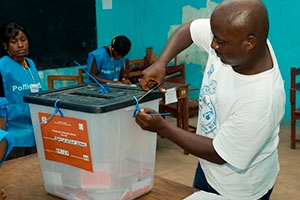Research
One-Stop for Election Results in 25 Countries

For more than a year, SPA Professor David Lublin has been gathering election results of upper house legislative races from 25 countries – from Belgium to Burma— to put together a comprehensive online database that will serve as a resource to researchers worldwide. The website, www.electionpassport.com, is the first of its kind and includes official records from states and regions in 25 countries going back several years.
The online dataset is arranged by constituency and currently contains results from a total of 184 elections, including all U.S. Senate elections since 1998. Other sections of the website, or Election Passport, include lower house election results, and historically important documents from countries where election results have never been digitized or publicly available in the past. The end goal of the database is to provide a one-stop website for election results that will enable researchers to advance their work in political science and better understand campaign trends. Lublin plans to expand the database, updating it with more countries and additional years of results as they become available.
On the new website, there are documents from countries that have never been digitized or publicly available before. With the database, researchers may be able to study elections by incumbency, and possibly gender and ethnicity.
“It will be free and open to academic researchers and the general public, preserving the electoral history of the world,” said Lublin. “It could be used in less-free countries to help assess vote manipulation,” said Lublin.
The project grew out of a book Lublin published with Oxford University Press in 2014 entitled Minority Rules: Electoral Systems, Decentralization and Ethnoregional Parties Success, and articles he’d written for the Journal of Politics and the British Journal of Political Science. The Election Passport was completed with the support of AU’s School of Public Affairs and its Center for Latin American and Latino Studies. Lublin worked with research assistants and translators to help collect and format the information from each state for the central clearinghouse.